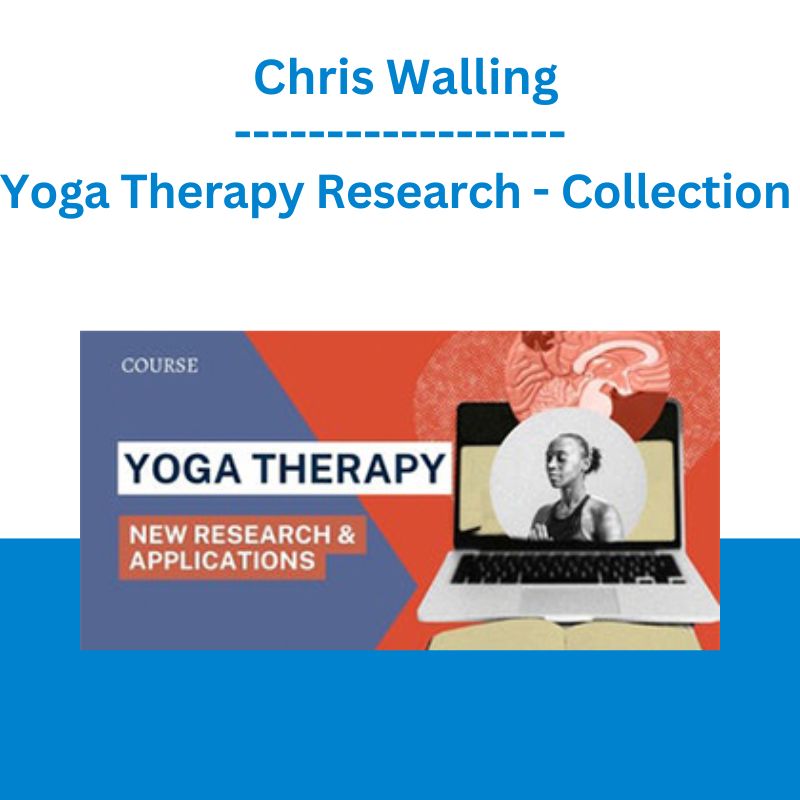*** Proof of Product ***
Exploring the Essential Features of “Yoga Therapy Research – Collection – Chris Walling”
Yoga has always been heralded for its therapeutic and healing properties. Over the course of the last thirty years, it has evolved into specific applications of yogic tools (postures, breathwork, meditation techniques and more) to address individual physical, mental and emotional needs. Today throughout the world there are thousands of providers who identify as yoga therapists, and nearly two hundred schools that train them in comprehensive clinical yoga therapy education programs that certify yoga therapists. The incorporation of integrative healthcare into modern medicine is ever the more dependent upon a shared understanding of how these ancient traditions may help advance the clinical outcomes of a number of health challenges which creates an urgent need to help advance the findings of an evidence informed practice of yoga. This endeavor is of course creating a need for research literacy within yoga practitioners who seek to serve within a more integrated continuum of care.
This course will help introduce students to the fundamentals of contemporary yoga therapy research, explore guidelines for yoga therapy research and practice, and survey the current and emerging body of knowledge within the peer-reviewed yoga therapy literature. Join us as Dr. Walling makes research inspiring and fun as we explore the intersections of scholarship and embodied practices.
Module 1: Fundamentals of Contemporary Yoga Therapy Research
Through a quest to help build a scientific evidence base for multi-disciplinary applications of yoga therapy, the student will compare and contrast the popular research methods employed by contemporary yoga therapy researchers, and evaluate the epistemic responsibilities of yoga therapy practitioners who seek to include often-subjugated types of knowledge into their research focus. This module will focus on redistributing epistemic power to agents that typically have been excluded from epistemic participation in contemporary yoga therapy research, while exploring the basics of research design and method.
Module 2: The Multidisciplinary Mystic: Calibrating the HPA Axis
Yoga based practices are multifaceted, multisensory interventions that involve a series of postures, movement sequences, breath regulation, deep relaxation and meditative techniques. This module explores the basic research behind the purported efficacy much of the theories that inform the yoga-based practices draw upon, and explores their impact upon allostatic and autonomic regulation of the human nervous system.
Module 3: Applied Research: Yoga For the Brain Health
Findings from a randomized controlled trial of yogic meditation will be explored as part of a comprehensive insight into the compounding effects of yoga therapy interventions within an overall “yogic” lifestyle framework. Studies will also be examined that employ more sophisticated measures such as neuroimaging studies and genetic biomarkers for examining pre and post effects in pilot studies.
Module 4: Questions & Answers
In this final module, students will engage in a summary dialogue of their first three modules, examine the numerous studies and journal articles read throughout the course, and discuss de-identified clinical case material.
Students who take this course will:
Compare and contrast the various research methods and challenges of contemporary basic research and clinical yoga therapy research.
Identify the ethical considerations of decolonizing interpretive research and the risks of cultural appropriation in clinical yoga therapy research.
Explore the common variables from psychophysiology of basic research yoga studies.
Identify the emerging experimental goals of yoga therapy research, and the new outcome measures in contemporary studies.
Explore complex randomized control trials within yoga therapy research and identify its integration within primary and secondary disease prevention strategies.
Author
Chris Walling
Dr. Chris Walling, PsyD, MBA, C-IAYT, SEP is Associate Professor in the School of Professional Psychology & Health at the California Institute of Integral Studies, Research Chair & Past-President of the United States Association for Body Psychotherapy and is a Clinical Research Fellow at the Kinsey Institute at Indiana University. He is the Vice President of Education & Outreach for the Alzheimer’s Research & Prevention Foundation, and Dean of Faculty at the Embodied Philosophy Institute. Dr. Walling is a licensed clinical psychologist and psychoanalyst and maintains a private practice in Los Angeles, California.
Please see the full list of alternative group-buy courses available here: https://lunacourse.com/shop/










 The Daily Traders – Exclusive Trading Mentorship Group
The Daily Traders – Exclusive Trading Mentorship Group  Toshko Raychev - Profit System + ITF Assistant
Toshko Raychev - Profit System + ITF Assistant  Alphashark - The AlphaShark SV-Scalper
Alphashark - The AlphaShark SV-Scalper  Racing Workshop - Complete Online Package
Racing Workshop - Complete Online Package  Crypto Dan - The Crypto Investing Blueprint To Financial Freedom By 2025
Crypto Dan - The Crypto Investing Blueprint To Financial Freedom By 2025  Fred Haug - Virtual Wholesaling Simplified
Fred Haug - Virtual Wholesaling Simplified  Money Miracle - George Angell - Use Other Peoples Money To Make You Rich
Money Miracle - George Angell - Use Other Peoples Money To Make You Rich  Julie Stoian & Cathy Olson - Launch Gorgeous - Funnel Gorgeous Bundle
Julie Stoian & Cathy Olson - Launch Gorgeous - Funnel Gorgeous Bundle